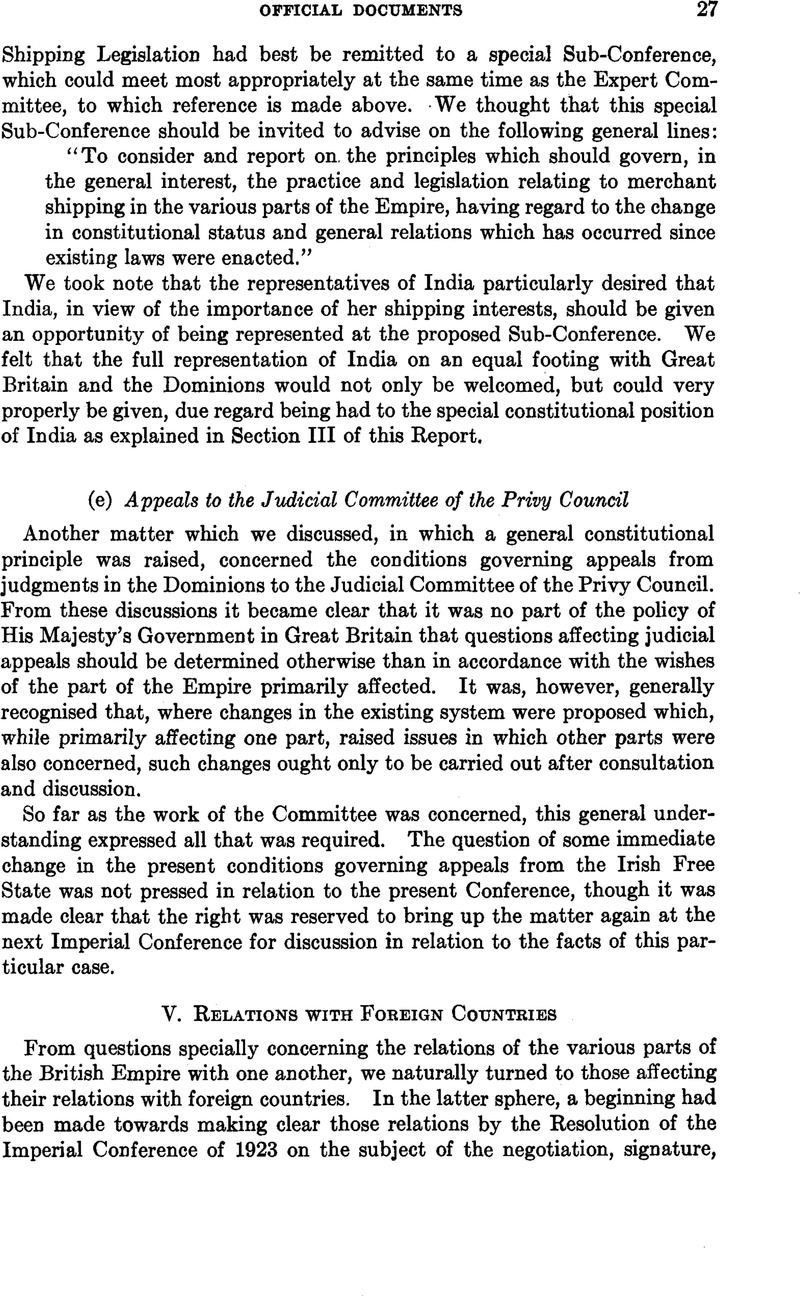No CrossRef data available.
Article contents
V. Relations with Foreign Countries
Published online by Cambridge University Press: 04 May 2017
Abstract

- Type
- Report of Inter-Imperial Relations Committee of the Imperial Conference, 1926
- Information
- American Journal of International Law , Volume 21 , Issue S2: Supplement Official Documents , April 1927 , pp. 27 - 34
- Copyright
- Copyright © American Society of International Law 1927
References
This Resolution was as follows:
“ The Conference recommends for the acceptance of the Governments of the Empire represented that the following procedure should be observed in the negotiation, signature, and ratification of international agreements.
The word ‘treaty’ is used in the sense of an agreement which, in accordance with the normal practice of diplomacy, would take the form of a treaty between Heads of States, signed by plenipotentiaries provided with Full Powers issued by the Heads of the States, and authorising the holders to conclude a treaty.
I
“ 1. Negotiation.
“ (a) It is desirable that no treaty should be negotiated by any of the governments of the Empire without due consideration of its possible effect on other parts of the Empire, or, if circumstances so demand, on the Empire as a whole.
“ (b) Before negotiations are opened with the intention of concluding a treaty, steps should be taken to ensure that any of the other governments of the Empire likely to be interested are informed, so that, if any such government considers that its interests would be affected, it may have an opportunity of expressing its views, or, when its interests are intimately involved, of participating in the negotiations.
“ (c) In all cases where more than one of the governments of the Empire participates in the negotiations, there should be the fullest possible exchange of views between those governments before and during the negotiations. In the case of treaties negotiated at International Conferences, where there is a British Empire Delegation, on which, in accordance with the now established practice, the Dominions and India are separately represented, such representation should also be utilised to attain this object.
“ (d) Steps should be taken to ensure that those governments of the Empire whose representatives are not participating in the negotiations should, during their progress, be kept informed in regard to any points arising in which they may be interested.
“ 2. Signature.
“ (a) Bilateral treaties imposing obligations on one part of the Empire only should be signed by a representative of the government of that part. The Full Power issued to such representative should indicate the part of the Empire in respect of which the obligations are to be undertaken, and the preamble and text of the treaty should be so worded as to make its scope clear.
“ (b) Where a bilateral treaty imposes obligations on more than one part of the Empire, the treaty should be signed by one or more plenipotentiaries on behalf of all the governments concerned.
“ (c) As regards treaties negotiated at International Conferences, the existing practice of signature by plenipotentiaries on behalf of all the governments of the Empire represented at the Conference should be continued, and the Full Powers should be in the form employed at Paris and Washington.
“ 3. Ratification. . “ The existing practice in connection with the ratification of treaties should be maintained.
II
“ Apart from treaties made between Heads of States, it is not unusual for agreements to be made between governments. Such agreements, which are usually of a technical or administrative character, are made in the names of the signatory governments, and signed by representatives of those governments, who do not act under Full Powers issued by the Heads of the States: they are not ratified by the Heads of the States, though in some cases some form of acceptance or confirmation by the governments concerned is employed. As regards agreements of this nature the existing practice should be continued, but before entering on negotiations the governments of the Empire should consider whether the interests of any other part of the Empire may be affected, and, if so, steps should be taken to ensure that the government of such part is informed of the proposed negotiations, in order that it may have an opportunity of expressing its views.“
The Resolution was submitted to the full Conference and unanimously approved. It was thought, however, that it would be of assistance to add a short explanatory statement in connection with part I (3), setting out the existing procedure in relation to the ratification of treaties. This procedure is as follows:
(а) The ratification of treaties imposing obligations on one part of the Empire is effected at the instance of the government of that part:
(b) The ratification of treaties imposing obligations on more than one part of the Empire is effected after consultation between the governments of those parts of the Empire concerned. It is for each government to decide whether Parliamentary approval or legislation is required before desire for, or concurrence in, ratification is intimated by that government.
* See p. 37




